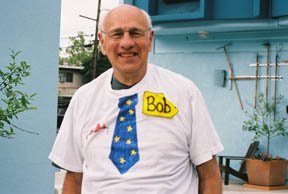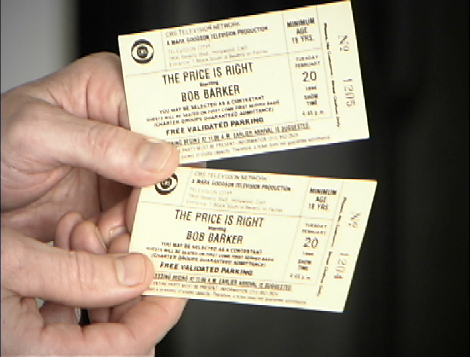In 2007, as we were wrapping up production we were interviewed by a writer who was preparing a story about Price Is Right fans (our tiny contribution to the article is in red below). What is most fascinating about the article is the comments and replies. So many people love Bob Barker!
End of an Era: The Price is Right — Mar 26th 2007
By Dakota Smith

Like a Broadway show in the midst of an endless run, The Price Is Right has changed little in the last 35 years. The three female models collectively known as Barker's Beauties still introduce dining room sets, trips to Fiji, and new cars. Specific games have come and gone, but longtime favorites like Plinko, Cliff Hanger, and In the Bag remain. And while Rich Fields may be the third announcer in the show's history, he still issues the classic invitation: "Come on down! You're the next contestant on The Price is Right!"
A shake-up, however, is on the way. This coming June, host Bob Barker will retire. And on the Los Angeles set-Stage 33 at CBS Television City-there's some trepidation about the future. As the network auditions such potential replacements as George Hamilton and George Lopez, even executive producer Roger Dobkowitz, who started working at the show in 1972, is in the dark about what's next.
"After 35 years, what's CBS going to do now?" says Dobkowitz. "No one wants the show to change."
Indeed, tinkering with the Price is Right formula seems sacrilegious. The top-rated and longest-running game show in America, and the top-rated daily show in the world, its fan base includes everyone from grandparents to college students (a demographic Barker secured during his beat down of Adam Sandler in Happy Gilmore).
Barker's impending departure has made the show more popular than ever. In previous seasons, ticket holders would line up in the early morning hours along Fairfax Avenue, the main drag outside Television City. Now the fans hit the sidewalk at 9:00 PM the night before, just for a chance to see Barker in his final run.
"It's the saddest thing, because it's end of an era," says Ken Ratliff, 52-year-old resident of Cle Elum, Washington. Having spent the night on the street, Ratliff and his 24-year-old son Adam were ensured two spots in the 330-seat theater. Yet they still had to wait outside in a concrete holding area until the taping began. Also waiting outside: Donna Devault and Christine Perenich, former college roommates who had flown in from Maryland and spent the night playing Scrabble and knitting in a tent on Fairfax Avenue.
Hopped up on lattes, these sleep-deprived and giddy women were hoping to be picked as contestants. Should they be so lucky, what pricing games did they intend to play? "Roll in the Die!" Perenich shouts. "Golden Road!" says Devault, who was wearing a t-shirt that read, Kiss My Mommy, Bob.
In fact the producers do pick the show's nine contestants from this concrete holding pen. They begin by asking people where they're from and what do they for a living. A simple process, perhaps. But as Dobkowitz explains, no other show selects its contestants on such short notice-and most vet and coach them beforehand. "We really are reality television," he says.
What they are looking for, says the producer, is contestants "who are happy, who are just themselves." Avoided are people who ham it up for the camera. "We've been doing this long enough so we know when people are faking it," Dobkowitz notes. And although 90 percent of the crowd shows up wearing some sort of homemade t-shirt paying homage to the show or its host, apparel is not a factor.
As for Barker himself, he looks older, but certainly not frail. During commercial breaks at the taping, he chats with the audience, accepts gifts (ties, t-shirts), and autographs a woman's arm, which bears a large tattooed image of Barker's face. When the audience begs him to repeat the notorious line from Happy Gilmore, he feigns innocence. "Oh, I don't know if I can say that," Barker tells them, turning to one of his producers. "Can I say, The price is wrong, bitch?" The audience goes nuts. The producer nods; obviously, she's heard this shtick before.
The most surprising thing about a visit to the set is the sheer noise. From the very start of the taping to the Showcase Showdown, the crowd screams, yells, and shrieks out numbers and prices, making it nearly impossible to hear the interaction onstage between Barker and the contestants.
According to Jeruschka White and Caryn Capotosto, who have interviewed hundreds of contestants for a documentary-in-progress called Come On Down!, about half the winners sell off their prizes immediately, unable to afford the tax bite. Others hang on at any cost. "Even if people don't like the car," says White, "they keep it for sentimental reasons."
Across the Web, countless fan sites track minute details about the show's history, such as the date that Barker's hair went gray (October 15, 1987). YouTube boasts a decent library of clips, including one episode with a major wardrobe malfunction-a contestant's tube top slipped down when she ran toward the stage. ("She came down, and out they came," exclaimed Barker at the time.)
Additionally, the show's official website maintains an encyclopedic Q-and-A section, recording such factoids as the biggest winnings to date ($147,517, won on September 19, 2006) and explaining why only American-made cars are given away. (Too many complaints from viewers, says the site, noting that the decision was made after the first Gulf War.) Diehard fans can also look forward to the publication this September ofCome On Down! Behind the Big Doors at The Price Is Right, a memoir penned by longtime producer Stan Blits.
According to Dobkowitz, the show's amazing longevity is due to several factors, including Barker's popularity and its relatively simple premise: knowing how much an item--be it a bottle of Aspercreme or a Ford Fiesta-costs. "What's happened now is that we're like comfort food," he says. "It reminds people of when they were seven years old and watching the show."
And what's his favorite part of the job? Dobkowitz says it's shepherding contestants offstage after they've played one of the pricing games. "It doesn't matter whether they've won or lost, they're so happy," he says. "They tell me they've been waiting to get on the show for the last 25 years."
A shake-up, however, is on the way. This coming June, host Bob Barker will retire. And on the Los Angeles set-Stage 33 at CBS Television City-there's some trepidation about the future. As the network auditions such potential replacements as George Hamilton and George Lopez, even executive producer Roger Dobkowitz, who started working at the show in 1972, is in the dark about what's next.
"After 35 years, what's CBS going to do now?" says Dobkowitz. "No one wants the show to change."
Indeed, tinkering with the Price is Right formula seems sacrilegious. The top-rated and longest-running game show in America, and the top-rated daily show in the world, its fan base includes everyone from grandparents to college students (a demographic Barker secured during his beat down of Adam Sandler in Happy Gilmore).
Barker's impending departure has made the show more popular than ever. In previous seasons, ticket holders would line up in the early morning hours along Fairfax Avenue, the main drag outside Television City. Now the fans hit the sidewalk at 9:00 PM the night before, just for a chance to see Barker in his final run.
"It's the saddest thing, because it's end of an era," says Ken Ratliff, 52-year-old resident of Cle Elum, Washington. Having spent the night on the street, Ratliff and his 24-year-old son Adam were ensured two spots in the 330-seat theater. Yet they still had to wait outside in a concrete holding area until the taping began. Also waiting outside: Donna Devault and Christine Perenich, former college roommates who had flown in from Maryland and spent the night playing Scrabble and knitting in a tent on Fairfax Avenue.
Hopped up on lattes, these sleep-deprived and giddy women were hoping to be picked as contestants. Should they be so lucky, what pricing games did they intend to play? "Roll in the Die!" Perenich shouts. "Golden Road!" says Devault, who was wearing a t-shirt that read, Kiss My Mommy, Bob.
In fact the producers do pick the show's nine contestants from this concrete holding pen. They begin by asking people where they're from and what do they for a living. A simple process, perhaps. But as Dobkowitz explains, no other show selects its contestants on such short notice-and most vet and coach them beforehand. "We really are reality television," he says.
What they are looking for, says the producer, is contestants "who are happy, who are just themselves." Avoided are people who ham it up for the camera. "We've been doing this long enough so we know when people are faking it," Dobkowitz notes. And although 90 percent of the crowd shows up wearing some sort of homemade t-shirt paying homage to the show or its host, apparel is not a factor.
As for Barker himself, he looks older, but certainly not frail. During commercial breaks at the taping, he chats with the audience, accepts gifts (ties, t-shirts), and autographs a woman's arm, which bears a large tattooed image of Barker's face. When the audience begs him to repeat the notorious line from Happy Gilmore, he feigns innocence. "Oh, I don't know if I can say that," Barker tells them, turning to one of his producers. "Can I say, The price is wrong, bitch?" The audience goes nuts. The producer nods; obviously, she's heard this shtick before.
The most surprising thing about a visit to the set is the sheer noise. From the very start of the taping to the Showcase Showdown, the crowd screams, yells, and shrieks out numbers and prices, making it nearly impossible to hear the interaction onstage between Barker and the contestants.
According to Jeruschka White and Caryn Capotosto, who have interviewed hundreds of contestants for a documentary-in-progress called Come On Down!, about half the winners sell off their prizes immediately, unable to afford the tax bite. Others hang on at any cost. "Even if people don't like the car," says White, "they keep it for sentimental reasons."
Across the Web, countless fan sites track minute details about the show's history, such as the date that Barker's hair went gray (October 15, 1987). YouTube boasts a decent library of clips, including one episode with a major wardrobe malfunction-a contestant's tube top slipped down when she ran toward the stage. ("She came down, and out they came," exclaimed Barker at the time.)
Additionally, the show's official website maintains an encyclopedic Q-and-A section, recording such factoids as the biggest winnings to date ($147,517, won on September 19, 2006) and explaining why only American-made cars are given away. (Too many complaints from viewers, says the site, noting that the decision was made after the first Gulf War.) Diehard fans can also look forward to the publication this September ofCome On Down! Behind the Big Doors at The Price Is Right, a memoir penned by longtime producer Stan Blits.
According to Dobkowitz, the show's amazing longevity is due to several factors, including Barker's popularity and its relatively simple premise: knowing how much an item--be it a bottle of Aspercreme or a Ford Fiesta-costs. "What's happened now is that we're like comfort food," he says. "It reminds people of when they were seven years old and watching the show."
And what's his favorite part of the job? Dobkowitz says it's shepherding contestants offstage after they've played one of the pricing games. "It doesn't matter whether they've won or lost, they're so happy," he says. "They tell me they've been waiting to get on the show for the last 25 years."



No comments:
Post a Comment